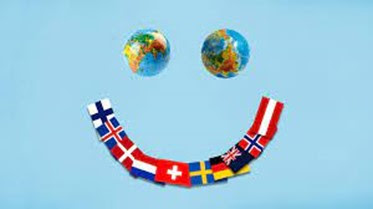Each year, a group of happiness experts from around the globe rank 156 countries based on how "happy" citizens are. They publish their findings in the World Happiness Report. Happiness might seem like an elusive concept to quantify, but there is a science to it.
When researchers talk about "happiness," they're referring to "satisfaction with the way one's life is going," Jeff Sachs, co-creator of the World Happiness Report and a professor at Columbia University, told recently. "It's not primarily a measure of whether one laughed or smiled yesterday, but how one feels about the course of one's life," he says.
Since the report began in 2012, Nordic countries — which include Denmark, Norway, Sweden, Finland and Iceland, plus the Faroe Islands and Greenland— consistently turn up at the top of the list. (The United States, on the other hand, lands somewhere around 18th or 19th place. Malaysia is 81).
Source: https://www.theatlantic.com
In 2019, Finland was ranked No. 1 for the second year in a row. Again, topped for 2020. In 2017, it was Norway, and Denmark grabbed first place in 2013 and 2016. Switzerland nabbed the top rank in 2015. This is no coincidence. Nordic countries rank so high on the happiness report because they have things like free education and healthcare, low crime rates, cushy social security nets, a relatively homogeneous population and they're fairly prosperous.
Perhaps most importantly, these countries prioritize balance, which is the "formula for happiness," Sachs says. "They're not societies that are aiming for all of the effort and time to becoming gazillionaires, they're looking for a good balance of life and the results are extremely positive," he says.
A "full-time" workweek in Denmark is typically 37 hours spread over the course of five days. On the other hand, the average American works 44 hours per week, or 8.8 hours per day, according to the Bureau of Labor Statistics.
While many Americans see working late as badge of honor and a way to get ahead, in Denmark it's seen as a weakness — it shows you can't get things done in the allotted work time.
To be as efficient as possible, Danes don't really socialize at work, or take breaks to run errands. Free time is "the most important thing they have," so it's rare that people would hang out with co-workers after working hours.
In Denmark, full-time employees are guaranteed five weeks of vacation time, regardless of their position or field of work. To put that in perspective, the average American worker with five years of experience is given 15 days of paid vacation, according to the Bureau of Labor Statistics. In Finland, many people spend their summers in cottages, called "mokki," where they unplug and relax with family and friends.
Freedom is another value that matters in a society, and determines someone's well-being, Sachs says. "Can you shape your life the way you want? If you're trapped by poverty, if you're trapped by debt, the answer will be no," he says. "If you have an opportunity to pursue the kind of life you want, the answer is yes. And if yes, that makes people a lot happier."
No matter where you live, research shows that finding work that really maps onto your core values can make you happier.
Although the culture and safety net in Nordic countries seems to promote happiness, life is not all warm. Nordic countries pay some of the highest taxes in the world. In Denmark, for example, there's a 25% sales tax, and a 150% tax on cars. People in Nordic countries are happy to pay those taxes because they get great universal social services in return. For example, daycare, public education including college and healthcare.
What will make us happy in Malaysia? We need a government with high integrity, caring for its people and believe in a work-life balance. It is pointless to suggest that we pay higher taxes if the Government is corrupt. Kleptocrats and cronies will “skin” the taxes for themselves. Nordic countries have very high integrity and people don’t steal on the street or in the office.
Then we need policies that are needs-based and not race-based. Religion is left as a private matter between you and God – not a public display of arrogance!
Employers need to treat employees as humans and not expect output today when it could be done tomorrow. Employers also need to consciously reduce work hours to 37 hours, 4 ½ days a week (Dubai is an example).
Maybe the Human Resources Ministry could map-out strategies after they do the usual “lawatan sambil belajar” of Finland or Denmark?
References:
1. Work-life balance secrets from the happiest countries in the world, Cory Stieg (https://www.cnbc.com)
2. We’re learning the wrong lessons from the world’s happiest countries, Joe Pinsker, 27 June 2021 (www.theatlantic.com)

No comments:
Post a Comment